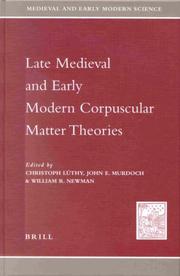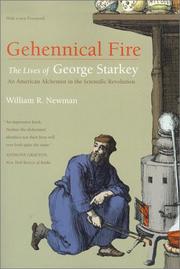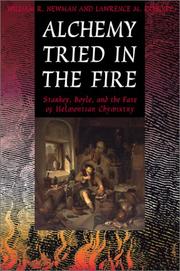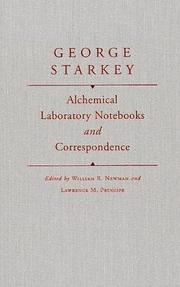| Listing 1 - 7 of 7 |
Sort by
|

ISBN: 9789004115163 9004115161 9789004453968 Year: 2001 Publisher: Leiden Boston : Köln,
Abstract | Keywords | Export | Availability | Bookmark
 Loading...
Loading...Choose an application
- Reference Manager
- EndNote
- RefWorks (Direct export to RefWorks)
This volume deals with corpuscular matter theory that was to emerge as the dominant model in the seventeenth century. By retracing atomist and corpuscularian ideas to a variety of mutually independent medieval and Renaissance sources in natural philosophy, medicine, alchemy, mathematics, and theology, this volume shows the debt of early modern matter theory to previous traditions and thereby explains its bewildering heterogeneity. The book assembles nineteen carefully selected contributions by some of the most notable historians of medieval and early modern philosophy and science. All chapters present new research results and will therefore be of interest to historians of philosophy, science, and medicine between 1150 and 1750.
Science --- Matter --- Mechanics --- Atomic theory --- Sciences --- Matière --- Mécanique --- Théorie atomique --- History --- Constitution. --- Philosophy --- History. --- Histoire --- Structure --- Philosophie --- 1200-1700 --- Atomisme --- Recherche --- Science, Medieval. --- Matière --- Mécanique --- Théorie atomique --- Science, Medieval --- Medieval science --- Constitution of matter --- Corpuscular theory of matter --- Constitution --- History, Early Modern 1451-1600 --- History, Medieval --- Physics --- history --- Natural philosophy --- Philosophy, Natural --- Physical sciences --- Dynamics --- Dark Ages --- Medieval history --- Medieval period --- Middle Ages --- World history, Medieval --- World history --- Civilization, Medieval --- Medievalism --- Renaissance

ISBN: 0226577147 Year: 2003 Publisher: Chicago (Ill.) : University of Chicago press,
Abstract | Keywords | Export | Availability | Bookmark
 Loading...
Loading...Choose an application
- Reference Manager
- EndNote
- RefWorks (Direct export to RefWorks)
Both the quest for natural knowledge and the aspiration to alchemical wisdom played crucial roles in the Scientific Revolution, as William R. Newman demonstrates in this fascinating book about George Starkey (1628-1665), America's first famous scientist. Beginning with Starkey's unusual education in colonial New England, Newman traces out his many interconnected careers--natural philosopher, alchemist, chemist, medical practitioner, economic projector, and creator of the fabulous adept, "Eirenaeus Philalethes." Newman reveals the profound impact Starkey had on the work of Isaac Newton, Robert Boyle, Samuel Hartlib, and other key thinkers in the realm of early modern science.
Alchemists --- Alchemy --- Science --- History. --- History --- Starkey, George,

ISBN: 1282932853 9786612932854 0226577139 9780226577135 0226577120 9780226577128 Year: 2004 Publisher: Chicago : University of Chicago Press,
Abstract | Keywords | Export | Availability | Bookmark
 Loading...
Loading...Choose an application
- Reference Manager
- EndNote
- RefWorks (Direct export to RefWorks)
In an age when the nature of reality is complicated daily by advances in bioengineering, cloning, and artificial intelligence, it is easy to forget that the ever-evolving boundary between nature and technology has long been a source of ethical and scientific concern: modern anxieties about the possibility of artificial life and the dangers of tinkering with nature more generally were shared by opponents of alchemy long before genetic science delivered us a cloned sheep named Dolly. In Promethean Ambitions, William R. Newman ambitiously uses alchemy to investigate the thinning boundary between the natural and the artificial. Focusing primarily on the period between 1200 and 1700, Newman examines the labors of pioneering alchemists and the impassioned-and often negative-responses to their efforts. By the thirteenth century, Newman argues, alchemy had become a benchmark for determining the abilities of both men and demons, representing the epitome of creative power in the natural world. Newman frames the art-nature debate by contrasting the supposed transmutational power of alchemy with the merely representational abilities of the pictorial and plastic arts-a dispute which found artists such as Leonardo da Vinci and Bernard Palissy attacking alchemy as an irreligious fraud. The later assertion by the Paracelsian school that one could make an artificial human being-the homunculus-led to further disparagement of alchemy, but as Newman shows, the immense power over nature promised by the field contributed directly to the technological apologetics of Francis Bacon and his followers. By the mid-seventeenth century, the famous "father of modern chemistry," Robert Boyle, was employing the arguments of medieval alchemists to support the identity of naturally occurring substances with those manufactured by "chymical" means. In using history to highlight the art-nature debate, Newman here shows that alchemy was not an unformed and capricious precursor to chemistry; it was an art founded on coherent philosophical and empirical principles, with vocal supporters and even louder critics, that attracted individuals of first-rate intellect. The historical relationship that Newman charts between human creation and nature has innumerable implications today, and he ably links contemporary issues to alchemical debates on the natural versus the artificial.
Science, Renaissance. --- Alchemy --- Arts, Renaissance. --- History. --- alchemy, perfection, science, bioengineering, ethics, cloning, nature, technology, genetics, artificial life, cyborg, robot, ai, dolly, natural, transformation, transmutation, genetic engineering, creation, power, control, bernard palissy, leonardo da vinci, homunculus, francis bacon, chemistry, chymical, medieval, nonfiction, renaissance, art, synthetic, experiment, visual arts.

ISBN: 9780262640626 0262140756 Year: 2006 Publisher: Cambridge London : MIT Press,
Abstract | Keywords | Export | Availability | Bookmark
 Loading...
Loading...Choose an application
- Reference Manager
- EndNote
- RefWorks (Direct export to RefWorks)
Astrology, European --- Alchemy --- History. --- 133.094 --- 133.509 --- 540.112094 --- Philosophy & psychology Parapsychology & occultism History Europe --- Philosophy & psychology Astrology History --- Sciences Alchemy History Europe --- 540.112 --- Sciences Alchemy --- European astrology --- Metals, Transmutation of --- Philosophers' egg --- Philosophers' stone --- Stone, Philosophers' --- Transmutation of metals --- Chemistry --- Occultism --- History --- Esoteric sciences --- History of chemistry --- alchemy --- astrology --- anno 1500-1799 --- Europe

ISBN: 0226577112 Year: 2002 Publisher: Chicago (Ill.) : University of Chicago press,
Abstract | Keywords | Export | Availability | Bookmark

ISBN: 0226577104 9780226577104 0226577015 9780226577012 Year: 2004 Publisher: Chicago : University of Chicago Press,
Abstract | Keywords | Export | Availability | Bookmark
 Loading...
Loading...Choose an application
- Reference Manager
- EndNote
- RefWorks (Direct export to RefWorks)
George Starkey-chymistry tutor to Robert Boyle, author of immensely popular alchemical treatises, and probably early America's most important scientist-reveals in these pages the daily laboratory experimentation of a seventeenth-century alchemist. The editors present in this volume transcriptions of Starkey's texts, their translations, and valuable commentary for the modern reader. Dispelling the myth that alchemy was an irrational enterprise, this remarkable collection of laboratory notebooks and correspondence reveals the otherwise hidden methodologies of one of the seventeenth century's most influential alchemists.
Alchemists --- Chemists --- Philosophers --- Starkey, George, --- Storkey, George, --- Stirk, George, --- G. S. --- S., G. --- Philalethes, Eirenaeus, --- Eirenaeus Philalethes, --- Aeyrenaeus Philalethes, --- Philalethes, Aeyrenaeus, --- Philalethes, Eirenaeus --- alchemy, chemistry, chymistry, science, methodology, philosophy, nature, minerals, elements, laboratory, research, experiments, history, ancient, metaphysics, nonfiction, george starkey, robert boyle, records, data, biography, chymical symbols, epistle to king edward unfolded, john winthrop, the key, samuel hartlib, frederick clodius.
Book
ISBN: 0262280620 0585435758 9780262280624 9780585435756 Year: 2001 Publisher: Cambridge, Mass. : MIT Press,
Abstract | Keywords | Export | Availability | Bookmark
 Loading...
Loading...Choose an application
- Reference Manager
- EndNote
- RefWorks (Direct export to RefWorks)
In recent years scholars have begun to acknowledge that the occult sciences were not marginal enterprises but an integral part of the worldview of many of our ancestors. Astrology was one of the many intellectual tools--along with what we consider to be the superior tools of social and political analysis--that Renaissance thinkers used to attack practical and intellectual problems. It was a coherent body of practices, strongly supported by social institutions. And alchemy was not viewed primarily as a spiritual pursuit, an idea popularized by nineteenth-century occultists, but as a part of natural philosophy. It was often compared to medicine. Many Renaissance writers suggested links between astrology and alchemy that went beyond the use of astrological charts to determine the best time to attempt alchemical operations. This book shows the many ways in which astrology (a form of divination) and alchemy (an artisanal pursuit concerned with the technologies of minerals and metals) diverge as well as intersect. Overall, it shows how an appreciation of the role of the occult opens up new ways of understanding the past. Topics include the career of Renaissance astrologer Girolamo Cardano and his work on medical astrology, the astrological thinking of Johannes Kepler and Galileo Galilei, the history of the Rosicrucians and the influence of John Dee, the work of medical alchemist Simon Forman, and an extended critique of the existing historiography of alchemy.
Astrology, European --- Alchemy --- Astrology --- Alchemy. --- Occultism --- History --- Humanities --- Parapsychology & Occult Sciences --- Social Sciences --- Aspects, Historical --- Historical Aspects --- Aspect, Historical --- Historical Aspect --- Histories --- Occultisms --- Chemistry --- European astrology --- Metals, Transmutation of --- Philosophers' egg --- Philosophers' stone --- Stone, Philosophers' --- Transmutation of metals --- History. --- history.
| Listing 1 - 7 of 7 |
Sort by
|

 Search
Search Feedback
Feedback About
About Help
Help News
News